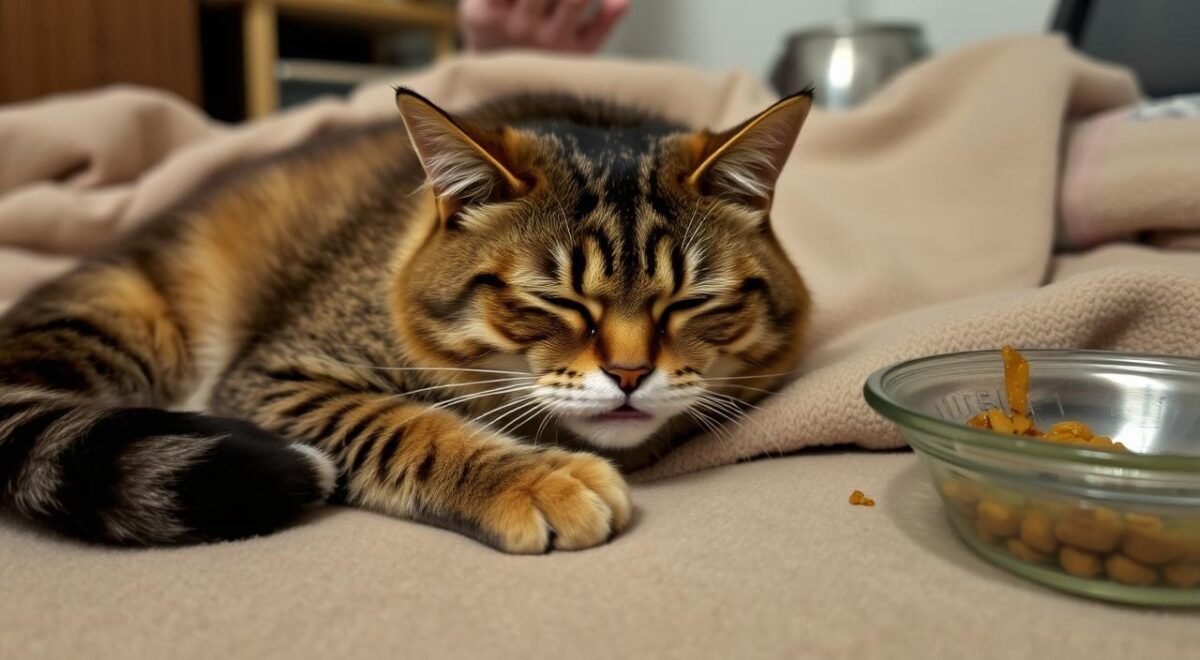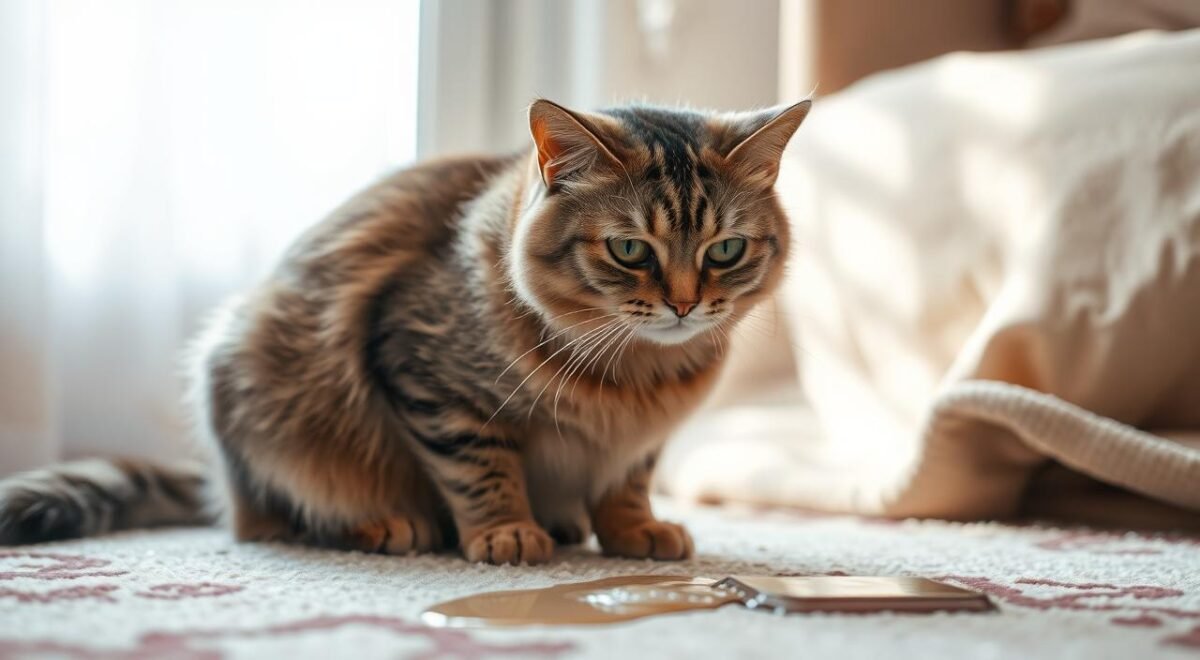Cats are experts at hiding when they’re not feeling well. It’s up to us to notice the small signs they give. Look out for changes in how they act, eat, and drink. Also, watch for vomiting, diarrhea, and breathing problems.
They might seem more shy or clingy than usual. Their looks can change too. Spotting these signs early is key to getting them the help they need.
Key Takeaways
- Changes in appetite or drinking habits can be significant indicators of health issues in cats.
- Weight changes such as sudden weight loss or gain should always be checked by a veterinarian.
- Regular veterinary check-ups are crucial for early disease detection and treatment.
- Nutrition plays a significant role in maintaining overall health in cats.
- Exercise and mental stimulation are key for the well-being of cats.
Understanding Cat Sickness and Its Early Warning Signs
As pet owners, knowing the early signs of illness in cats is key. Spotting cat illness symptoms, feline health problems, and sick cat behavior early can help. This way, you can act fast and prevent bigger issues.
Changes in Behavior and Activity Level
One early sign of illness in cats is a change in behavior or activity. Look for signs like being more tired, clingy, or less playful. Cats often hide their sickness, so watching for these changes is important.
Physical Appearance Changes
Changes in your cat’s looks can also hint at health issues. A messy coat, signs of pain, or weight changes are signs of trouble. Spotting these small changes early can help catch problems before they get worse.
Alterations in Eating and Drinking Habits
Big changes in eating and drinking habits are a clear sign of cat illness symptoms. A big change in appetite or water intake can mean health issues like digestive problems or dental issues. Watching these habits closely can help you know when to see a vet.
By keeping an eye out for these signs, you can help your cat stay healthy. Remember, cats are good at hiding when they’re not feeling well. It’s up to us to notice and act on any changes in their behavior or health.

Why Is My Cat Being Sick?
Cats can get sick for many reasons. It’s important to know what might be causing their vomiting. This helps vets figure out what’s wrong and how to fix it.
One big reason for cat sickness is digestive system problems. Food allergies or eating something bad can make them vomit. It’s very important to get them help right away if they eat something toxic.
Also, infections can make cats very sick. This includes bacteria, viruses, and fungi. Chronic diseases like diabetes, hyperthyroidism, or kidney disease can also cause vomiting.
Stress and changes in their environment can also make cats sick. New people, pets, or even changes in the house can upset them. This can lead to vomiting and other health problems.
The color and texture of a cat’s vomit can tell us a lot. For example, bile-colored vomit might mean a problem with their digestive system. Undigested food could mean they’re eating too fast or have a gut issue.
If your cat keeps vomiting, you need to see a vet. They might do abdominal X-rays, blood work, and more tests. This helps find out what’s wrong and how to fix it.
Knowing why cats get sick helps us take care of them better. We can spot the signs early and get them the help they need. This keeps our furry friends healthy and happy.

| Cause | Symptoms | Potential Treatments |
|---|---|---|
| Digestive System Issues | Vomiting, diarrhea, loss of appetite | Dietary changes, medication, treatment of underlying condition |
| Infections and Diseases | Vomiting, fever, lethargy | Antibiotics, antiviral or antifungal medications, treatment of chronic illness |
| Environmental Factors and Stress | Vomiting, changes in behavior, litter box issues | Environmental enrichment, calming supplements, behavioral modification |
If your cat keeps vomiting or is very sick, see a vet fast. They can find out what’s wrong and help your cat feel better.
Common Causes of Feline Vomiting and Illness
When your cat vomits, it worries you. There are many reasons for this, like digestive problems, infections, and environmental factors. Knowing these can help you treat your cat’s cat vomiting treatment, feline health problems, and cat digestive issues.
Digestive System Issues
Changes in diet or eating something bad can upset a cat’s stomach. How fast they eat and how much can also cause vomiting. Hairballs are another common problem, especially if they happen often.
Vomiting can also mean there’s something in their stomach that shouldn’t be there.
Infections and Diseases
Digestive problems like gastroenteritis and inflammatory bowel disease can make cats vomit. Infections and diseases, like upper respiratory infections, can also cause it. Allergies or toxins in their food or environment can lead to vomiting too.
Environmental Factors and Stress
Stress from changes in routine or living conditions can upset a cat’s stomach. Dental issues, like periodontal disease, can also cause vomiting.
It’s important to find out why your cat is vomiting. This helps you give the right cat vomiting treatment and care for their feline health problems and cat digestive issues. Always talk to a vet for the best care.
“Vomiting can be a symptom of more serious conditions in cats, including diabetes, hyperthyroidism, kidney disease, thyroid disease, and cancer.”
Recognizing Critical Symptoms in Cats
As pet owners, it’s key to watch our cats for illness signs. Cat illness symptoms can turn serious fast if ignored. Spotting these signs early helps keep our cats healthy and gets them the vet care they need.
Look out for difficulty breathing. Cats might show an elongated neck or lie on their front with elbows out. They might also pant or have blue-tinged gums, all signs of a serious breathing problem.
Other red flags include excessive drooling, sudden collapse, and seizures. Severe vomiting or diarrhea and trouble urinating can lead to dehydration. These feline health problems need vet attention right away.
Also, watch for loss of appetite, sudden weight loss, and severe lethargy. Gum color changes, like pale or yellow, can signal serious health issues that need quick medical help.
Spotting these sick cat behavior signs early is vital. Quick action can save our cats’ lives. By staying alert and acting fast, we help our cats get the care they need to stay healthy.
| Critical Symptom | Potential Cause | Urgency of Care |
|---|---|---|
| Difficulty Breathing | Respiratory Distress, Lung Issues | Immediate Veterinary Attention |
| Excessive Drooling | Dental Problems, Nausea | Veterinary Assessment Recommended |
| Sudden Collapse | Cardiovascular, Neurological Issues | Emergency Veterinary Care |
| Seizures | Neurological Disorders, Toxicity | Immediate Veterinary Intervention |
| Severe Vomiting/Diarrhea | Gastrointestinal Problems, Dehydration | Urgent Veterinary Attention |
| Inability to Urinate | Urinary Tract Blockage | Emergency Veterinary Care |
Knowing these cat illness symptoms and acting fast helps keep our cats healthy and happy for years to come.
Changes in Litter Box Habits and What They Mean
Watching your cat’s litter box habits is key to their health. Changes in how they use the litter box can tell you a lot. These changes might mean they need help fast.
Urinary Issues and Related Problems
Seeing your cat pee a lot, strain, or find blood in their urine is a red flag. These signs often point to urinary tract problems. Issues like UTIs or feline interstitial cystitis can make your cat uncomfortable. They might then choose to pee somewhere else in your home.
Stool Changes and Their Significance
Changes in your cat’s stool, like diarrhea or constipation, are important. They can mean problems with their digestive system or even serious health issues. Diarrhea might show gastrointestinal problems. Constipation could mean dehydration, blockages, or other serious conditions.
Frequency and Volume Concerns
Big changes in how often or how much your cat pees or poops are worrying signs. Less pee or more poop could mean kidney issues, diabetes, or other serious health problems. These need quick vet visits.
FAQ
What are the common signs that my cat is sick?
Signs your cat might be sick include changes in behavior and eating habits. They might vomit, have diarrhea, or show respiratory symptoms. Cats may also act differently, like being more clingy or withdrawn.
Changes in their physical appearance are also important. Early detection is key for getting your cat the care they need.
What are the early warning signs of cat sickness?
Early signs of sickness in cats include changes in behavior and physical appearance. They might seem more tired or clingy. Their fur could look unkempt or their coat dull.
Changes in eating and drinking habits are also important. Watching for these signs helps catch health problems early.
What are the common causes of cat vomiting and illness?
Cats can get sick from many things. Infections, chronic diseases, and parasites are common causes. They might also get sick from eating something toxic.
Stress and environmental factors can also play a role. Digestive issues, like food allergies, can cause vomiting too.
What are the common causes of feline vomiting and illness?
Digestive issues like food allergies or inflammatory bowel disease can cause vomiting. Infections and diseases, such as upper respiratory infections, can also cause symptoms.
Stress and environmental changes can affect a cat’s health. Dental problems, like periodontal disease, can also lead to vomiting and other health issues.
What are the critical symptoms in cats that require immediate veterinary attention?
Symptoms that need immediate vet attention include trouble breathing and excessive drooling. Sudden collapse, seizures, and severe vomiting or diarrhea are also critical.
Other serious signs include not wanting to eat, sudden weight loss, and extreme tiredness. Changes in gum color can also indicate serious health problems. Cats showing these symptoms need to see a vet right away.
What changes in litter box habits can indicate health issues in cats?
Changes in litter box habits can signal health problems. Urinary issues like frequent urination or blood in urine are signs. Stool changes, like diarrhea or constipation, can also indicate digestive problems.
Changes in how much or how often your cat urinates can be a sign of kidney problems. Watching litter box habits helps track your cat’s health and catch potential problems early.
Source Links
- https://urgentvet.com/sick-cat-symptoms-signs-of-illness/
- https://vcahospitals.com/know-your-pet/recognizing-signs-of-illness-in-cats
- https://www.hillcrestanimals.com/site/blog-memphis-vet/2020/03/12/how-to-tell-if-your-cat-is-sick
- https://www.thesprucepets.com/signs-your-cat-is-sick-4165142
- https://www.angelanimalhospital.com/site/blog/2021/07/18/how-tell-cat-sick-signs-symptoms
- https://www.7hillsvet.com/services/cats/blog/7-signs-your-cat-may-be-sick-warrant-call-vet
- https://bestfriends.org/pet-care-resources/cat-vomiting-types-causes-and-treatments
- https://www.purina.co.uk/articles/cats/health/digestion/cat-vomiting
- https://www.cats.org.uk/help-and-advice/health/vomiting-in-cats
- https://1stpetvet.com/is-your-cat-throwing-up-look-to-these-7-common-causes/
- https://www.petmd.com/cat/symptoms/cat-vomiting-causes-and-types
- https://vcahospitals.com/know-your-pet/vomiting-in-cats
- https://www.embracepetinsurance.com/waterbowl/article/how-to-tell-if-your-cat-is-sick
- https://anicira.org/resources/10-signs-your-cat-is-having-a-veterinary-emergency/
- https://catsonlyvc.com/10-subtle-signs-cat-may-illness/
- https://www.aspca.org/pet-care/cat-care/common-cat-behavior-issues/litter-box-problems
- https://www.ddfl.org/resources/solving-litter-box-problems/






